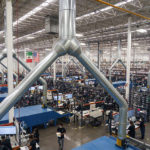With many businesses struggling to deal with the repercussions of the pandemic, the face of the automotive industry could be set to change significantly as companies try to protect themselves against further supply chain outages, material shortfalls, trade restrictions and tariffs
The United States and Canada continue to invest in innovation and technology to prepare for the increased production levels resulting from these shifts in production. Mexico, however, is well positioned for bringing parts of the supply chain closer to the end user, particularly as the country already has a large manufacturing base including, within the automotive industry, major OEM’s and Tier I and Tier II organizations.
Across many industries, globalization as we know it may well have run its course as technological changes and corporate strategies lead to more products being made locally or delivered digitally. Moving forward, automotive companies may well look to regionalization and bring production closer to their destination. However, it is probably too early to speak of ‘de-globalization’ as a mainstream trend.

In the US, facilitating the entire production process locally ignores the comparatively higher cost of labor, capacity constraints and production specialization available. However, bringing production closer to the end consumer could still be a desirable middle ground. OEMs and automotive suppliers are likely to consider the entire supply chain and be intentional in planning alternative sourcing options. These alternative sourcing options will reduce the dependency on a single supplier or geographical location. Looking beyond the States, potential winners of regionalization could be Mexico and Latin America.
As companies look to reimagine more resilient supply chains and embrace new technologies for smarter production, it is ultimately the weaker economies which will be impacted most. Political and other pressures will likely prevent globalization from reaching its pre-pandemic peak. If there is a step away from globalization, smaller countries will feel the change as it is much harder for them to diversify production and they remain reliant on being part of global supply chains.
Disruption may have revealed vulnerabilities in the automotive supply chain, but it has also accelerated the adoption of digital tools as an advantage. If the automotive industry in the Americas and beyond is to harness the potential of new advancements, despite the many challenges that remain, one thing is for certain, greater levels of collaboration, resilience and action is required by all.
sources:
https://www.rsm.global/insights/sector-insights/shining-spotlight-automotive-supply-chains-americas
https://sloanreview.mit.edu/article/is-it-time-to-rethink-globalized-supply-chains/




whoah this blog is wonderful i really like reading your articles. Keep up the great paintings! You realize, a lot of people are hunting round for this info, you could help them greatly.